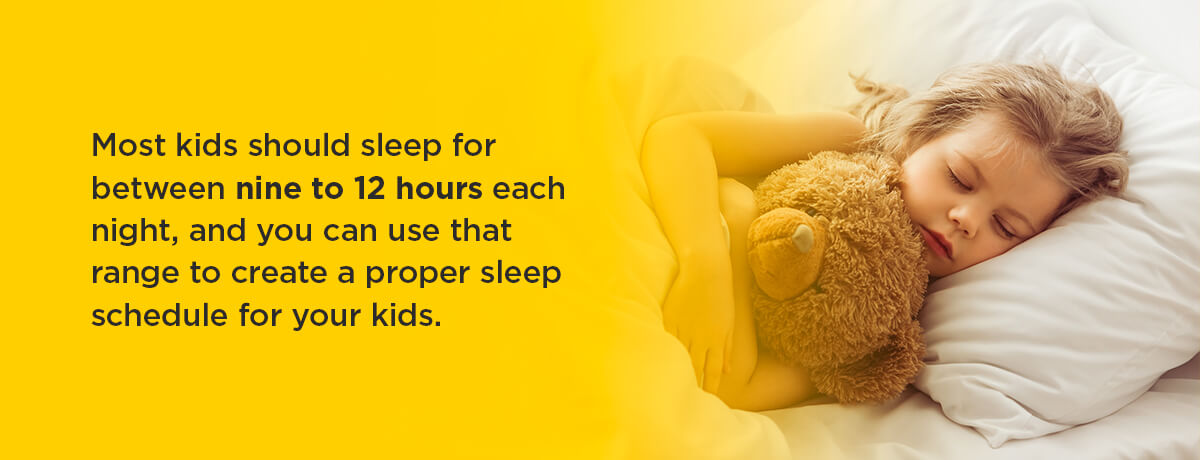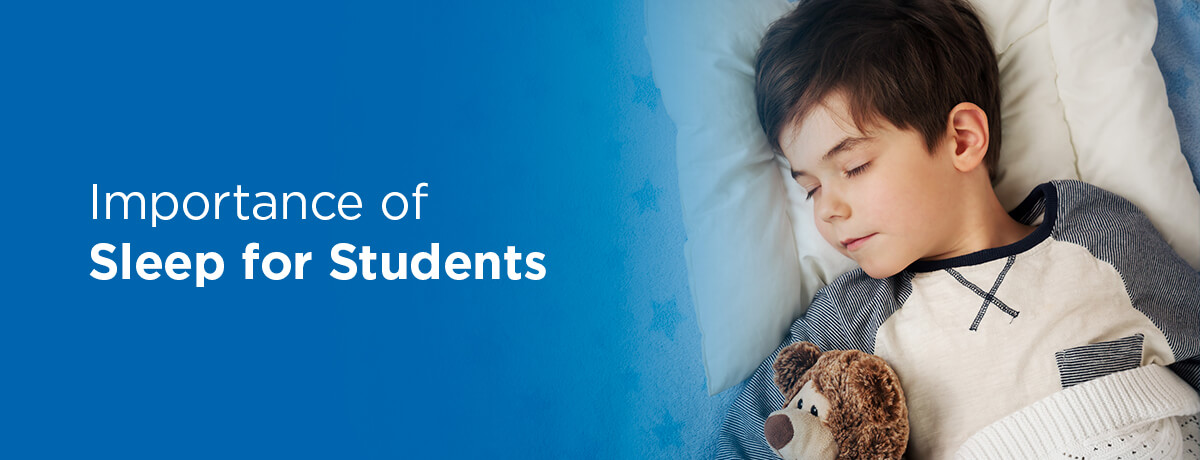It’s no secret that sleep plays a critical role in a child’s behavior — and that can directly impact their education. With enough sleep, students are properly equipped to improve their focus, concentration, and overall performance in school. Similarly, children who get enough sleep are at a lower risk for health problems such as obesity, depression, and anxiety. Therefore, sleep loss, learning capacity, and academic performance all go hand in hand.
Unfortunately, many children aren’t getting the amount of sleep they need. Nearly 58% of middle school students don’t get the recommended amount of sleep each night — and that number jumps to nearly 73% for high school students. How can you emphasize the importance of getting enough sleep for your students? Keep reading to learn more.
Typical Causes of a Lack of Sleep
Before you can improve your child’s sleep schedule, you must first understand why they aren’t sleeping for long enough:
- Hormonal time shift: As children go through puberty, hormones shift their body’s internal clock forward by a couple of hours. As a result, teenagers are likely to want to go to sleep about two hours later than they would previously. That said, school times never change, so students’ bodies tell them to go to bed late and their schools make them wake up early, leading to sleep deprivation.
- Using screen-based devices: At least 60% of students use screen-based devices in the hour before they go to sleep. The use of screen-based devices before going to sleep cuts into time they could spend sleeping and stimulates the brain rather than relaxing it.
- Social and school obligations: With homework assignments, sports practice, social events, family time, part-time jobs, clubs, and more, students have a lot they need to fit into the few hours available after school. If students don’t have enough time to accomplish everything, they have to cut something out — and a healthy amount of sleep is typically one of the first things to go.
- Sleep disorders: Though certainly not the child’s fault, sleep disorders can also add to the lack of sleep experienced by school students. A disorder such as sleep apnea, insomnia, or restless leg syndrome could only add to the other variables in a student’s life preventing them from sleeping for long enough.
How a Lack of Sleep Affects Students
Losing a little bit of sleep every night can easily add up. But why is sleep important for a student’s learning? A lack of sufficient sleeping time for students can greatly impact academic performance and learning capacity in several major ways. Here are specific issues that can stem from a poor sleep schedule:
1. Limits Planning and Organization Skills
A lack of sleep can have an impact on how a child thinks. The section of the brain responsible for planning and organization is frequently affected by sleep loss, leading students to experience problems in these areas. For example, a student suffering from sleep loss might have difficulty managing time during after-school activities, leading them to miss important appointments or rush their schoolwork and studying.
2. Worsens Mood and Behavior
It’s well-known to parents that children’s moods and behavior are negatively affected by sleep loss. These effects can manifest in shorter tempers, decreased self-control, mood swings, and weakened inhibitions. Exhibiting bad behavior can get students in trouble, take them away from learning, and make them less willing to learn.
3. Reduces Focus and Attention
A lack of sleep can also negatively impact focus and attention. Feeling sleepy during the day might cause students to feel drowsy or doze off in class, making students distracted instead of fully focused on the lesson. These situations can be especially harmful during tests, when full concentration and awareness are necessary for success.
4. Decreases Memory
Because sleep loss reduces focus, it’s more difficult for a tired student to form and recall new memories. A tired brain is unable to devote the proper resources to memory creation and recall. As a result, sleep-deprived kids might struggle on tests because they can’t remember what they studied, or they might find that the readings they did the night before have totally escaped their memory.
5. Increases Mental and Physical Tiredness
Additionally, sleep loss can increase mental and physical tiredness. A sleep-deprived child doesn’t get the rest and recuperation they need to go about their daily activities effectively. Therefore, students may feel mentally exhausted throughout the school day, and student-athletes specifically may be too tired to perform their best during practices and games.

Tips to Create a Healthy Sleep Schedule
Now, how long should kids sleep each night? Keep in mind that every child is different, so your teenager may operate on less sleep than your younger kids for various reasons. However, most kids should sleep for between nine to 12 hours each night, and you can use that range to create a proper sleep schedule for your kids. Fortunately, creating a healthy sleep schedule is relatively simple.
Following these tips can greatly improve your child’s sleep schedule:
1. Avoid Drinks and Food That Can Interfere With Sleep
Diet can have a large impact on a child’s sleep schedule. Any beverage with caffeine is something students should avoid before bedtime, which means cutting back on coffee and soda late at night. It may even help to have your kids stop drinking caffeinated beverages by the afternoon.
Beyond caffeinated drinks, students should also avoid consuming processed foods and foods high in sugar before bedtime. Eating this kind of pre-bedtime snack is associated with poorer sleep in preschoolers. Additionally, a recent study found that decreased intake of fruits and vegetables negatively affects sleep duration.
Students should strive to eat a balanced diet so they can lead a healthy life.
2. Establish a Bedtime Routine
Establishing a pre-sleep routine will help wind your student’s brain down from the day’s activities. Doing breathing exercises, stretching, or listening to quiet, relaxing music could all be activities they do before turning in for the night. This routine will help relax your child from the stress of the day and remind their brain it’s time to go to sleep.
3. Make Your Bedroom Quiet and Relaxing
If there are a lot of distractions in your student’s bedroom, it’ll be challenging for your child to go to sleep quickly. Try closing windows, turning off the television, and putting the thermometer at a cooler temperature to make it easier for your child to fall asleep.
4. Turn Off Devices 30 Minutes Before Bedtime
While putting away phones and laptops might be difficult, it’s essential to reduce screen time before bed. This way, your child can more easily transition to “bedtime mode,” helping them fall asleep quicker and more peacefully. Instead of turning to electronics, fill the time before bed with reading, taking a bath, or preparing for tomorrow.
5. Exercise Regularly
Aside from the obvious health benefits of exercise, medical experts say regular exercise can help students fall asleep faster while also improving their quality of sleep. Even for children who aren’t part of a sports team, regular exercise can greatly improve their sleep schedule and overall health.
Improve Your Student’s Sleep Schedule With the Flexibility of Cyber School
Clearly, sleep is an important aspect of many students’ academic success. By following the tips for building a healthy sleep schedule, you can help craft a better academic future for your child.
Unfortunately, it’s not always easy to implement some of these strategies. It can be challenging to reconcile early start times at public schools with your student’s shifting internal clock. At CCA, we offer flexible school day scheduling, allowing students to customize their day around outside factors such as sleep schedules. Here, learning works with your student’s sleep schedule rather than against it.
Contact us today to learn how CCA works for Pennsylvania students and families!




